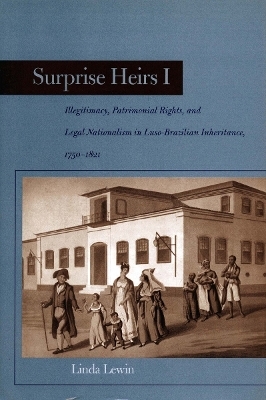
Surprise Heirs I
Illegitimacy, Patrimonial Rights, and Legal Nationalism in Luso-Brazilian Inheritance, 1750-1821
Seiten
2003
Stanford University Press (Verlag)
978-0-8047-3881-1 (ISBN)
Stanford University Press (Verlag)
978-0-8047-3881-1 (ISBN)
- Lieferbar (Termin unbekannt)
- Versandkostenfrei
- Auch auf Rechnung
- Artikel merken
This work situates the patrimonial rights of illegitimate offspring in Brazil within a system of Luso-Brazilian heirship that operated in the final half century of Portugese colonial rule. The book offers an explanation of how the rules of inheritance applied to people born outside of wedlock.
This book situates the changing patrimonial rights of illegitimate offspring in Brazil within a system of Luso-Brazilian heirship that operated during the final half century of Portuguese colonial rule. Besides offering the first detailed explanation of how the rules of inheritance applied to people born outside wedlock, the book’s focus on illegitimacy and patrimony provides a new perspective for assessing how family formation figured broadly in late colonial Brazil’s social evolution.
Innovatively integrating legal history with recent research on the post-1750 history of the family in Brazil, the book reveals the significance of customary marriage and consensual cohabitation, clerical concubinage, concealed paternity, and foundling wheels for Latin American social organization. By reformulating the private law of family and inheritance, Portuguese legal nationalism transformed the juridical meaning of bastardy and anticipated the emergence of the “surprise heir,” who figured so prominently in imperial Brazil’s courtroom dramas and novels.
This book situates the changing patrimonial rights of illegitimate offspring in Brazil within a system of Luso-Brazilian heirship that operated during the final half century of Portuguese colonial rule. Besides offering the first detailed explanation of how the rules of inheritance applied to people born outside wedlock, the book’s focus on illegitimacy and patrimony provides a new perspective for assessing how family formation figured broadly in late colonial Brazil’s social evolution.
Innovatively integrating legal history with recent research on the post-1750 history of the family in Brazil, the book reveals the significance of customary marriage and consensual cohabitation, clerical concubinage, concealed paternity, and foundling wheels for Latin American social organization. By reformulating the private law of family and inheritance, Portuguese legal nationalism transformed the juridical meaning of bastardy and anticipated the emergence of the “surprise heir,” who figured so prominently in imperial Brazil’s courtroom dramas and novels.
Linda Lewin is Professor of History at the University of California, Berkeley. She is the author of Politics and Parentela in Paraíba: A Case Study of Family-Based Oligarchy in Brazil.
| Erscheint lt. Verlag | 15.1.2003 |
|---|---|
| Verlagsort | Palo Alto |
| Sprache | englisch |
| Maße | 152 x 229 mm |
| Gewicht | 490 g |
| Themenwelt | Geschichte ► Teilgebiete der Geschichte ► Kulturgeschichte |
| Recht / Steuern ► EU / Internationales Recht | |
| Recht / Steuern ► Privatrecht / Bürgerliches Recht ► Sachenrecht | |
| Sozialwissenschaften ► Soziologie ► Mikrosoziologie | |
| ISBN-10 | 0-8047-3881-5 / 0804738815 |
| ISBN-13 | 978-0-8047-3881-1 / 9780804738811 |
| Zustand | Neuware |
| Haben Sie eine Frage zum Produkt? |
Mehr entdecken
aus dem Bereich
aus dem Bereich
der stille Abschied vom bäuerlichen Leben in Deutschland
Buch | Hardcover (2023)
C.H.Beck (Verlag)
CHF 32,15
vom Mittelalter bis zur Gegenwart
Buch | Softcover (2024)
C.H.Beck (Verlag)
CHF 16,80


